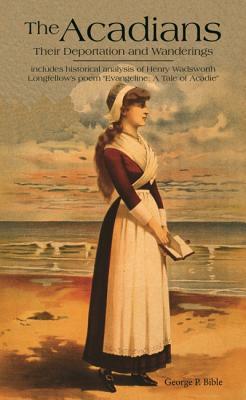The true tale behind the tragic poem is revealed.
On September 5, 1755, the British declared that all Acadians were to be expelled from their homeland of Nova Scotia. The Acadians were forcibly removed from their homes and deported. They wandered for decades, searching for their families and hoping to find a place to call home; many were never reunited with love ones and died as exiles, living as outcasts in unfamiliar lands. George P. Bible uses Henry Wadsworth Longfellow's original poem Evangeline: A Tale of Acadie and the poignant account of Emmeline Labiche, the real-life orphan who inspired the story, as a basis for his treatise. His research explores the facts underlying each section of the famous poem, revealing the real families, many of whom settled at last in the fertile lands of Louisiana. With correspondence detailing oral histories, along with sketches of family heirlooms, Bible provides a glimpse of a resilient people and a tragic history.

The true tale behind the tragic poem is revealed.
On September 5, 1755, the British declared that all Acadians were to be expelled from their homeland of Nova Scotia. The Acadians were forcibly removed from their homes and deported. They wandered for decades, searching for their families and hoping to find a place to call home; many were never reunited with love ones and died as exiles, living as outcasts in unfamiliar lands. George P. Bible uses Henry Wadsworth Longfellow's original poem Evangeline: A Tale of Acadie and the poignant account of Emmeline Labiche, the real-life orphan who inspired the story, as a basis for his treatise. His research explores the facts underlying each section of the famous poem, revealing the real families, many of whom settled at last in the fertile lands of Louisiana. With correspondence detailing oral histories, along with sketches of family heirlooms, Bible provides a glimpse of a resilient people and a tragic history.